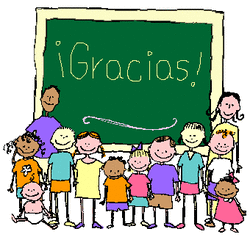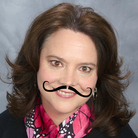
In interviews with students of a Golden Apple candidate, the students had this to say about their teacher:
A few years ago, I attended a workshop on assessment with Greta Lundgaard at CSCTFL. She made a comment that has stuck with me ever since: "It's not about you, it's about students." So many times as teachers, we do what's convenient, what's easier or what we've done before. It's human, but it may not be good teaching. For me backward design, is a kind of math formula: Think of your student outcomes (learning targets, SLOs, etc.) as X; then consider your students (varies by class - interests, personalities, etc.) the Y. My plan for any given unit is the result of that equation: X + Y = Unit or Lesson Plan and accompanying Assessments. To begin with students, I ask myself, "Why would this group of students want to know how to do ____?" and "Under what conditions might this group of students have authentic opportunity to use ______." That thinking process allows me to design a Performance Assessment that is relevant and engaging for my students.
If I want my students to be able to do on-their-feet interpersonal conversation as an assessment, I need to give them plenty of opportunities to practice the activity with a variety of partners. For me that translates into a 4-desk seating grouping that allows for a face-partner, a shoulder-partner and a group, but it also means they're also randomly paired. If I want my students to become intermediate users of language, I have to challenge them to take risks, to create language by mixing and matching language chunks and to both ask and answer questions. I have to let go of their mistakes while they practice this important step in language learning . . . moving from the memorized and practiced to the created and error-filled. As a teacher, I have to resist the urge to kill the creativity via correction. Studies show that it doesn't help anyone except the teacher who perhaps feels better because he/she knew the right way to say it. If there's math we need to let go of in the language classroom, it's "Penalty Math." (Sorry, you didn't raise your hand -1, you forgot an accent -1/2, you used the imperfect instead of the preterit -1, you didn't use double-object pronouns -2 for both . . . ) Grading that forgets the overall big picture - growing proficiency over time - is the reason students leave us with only 2 years of language. (We need to keep students with us long enough to become confident in their ability to communicate and willing to continue to improve their skills) My rule of thumb has become -- if you communicate your message to me (i.e., you would have been understood by a sympathetic native speaker in the target country) you pass. You succeed! You find the bathroom, you order your food, you find your train, etc. Then I communicate with the student, Wow! You can do this, but now let's work on making it better - let's up the accuracy - let's up the quality, so you can use language, not just on vacation, but for your career.
The next time you're tempted to do what's convenient, what's easy, what's redundant - may Greta's words reverberate in your brain as they do in mine, "It's not about you, it's about students."
- "He knows what I can do and makes me want to, even if its hard."
- "He says, <You got a B, now let's see you get an A.>"
- "I was really shy. He told me I had a voice and thoughts that people needed to hear."
- "He took extra time to explain it to me again, make it simpler, you know, so I could understand."
- "He's easy to talk to when you have a problem because you know he cares."
A few years ago, I attended a workshop on assessment with Greta Lundgaard at CSCTFL. She made a comment that has stuck with me ever since: "It's not about you, it's about students." So many times as teachers, we do what's convenient, what's easier or what we've done before. It's human, but it may not be good teaching. For me backward design, is a kind of math formula: Think of your student outcomes (learning targets, SLOs, etc.) as X; then consider your students (varies by class - interests, personalities, etc.) the Y. My plan for any given unit is the result of that equation: X + Y = Unit or Lesson Plan and accompanying Assessments. To begin with students, I ask myself, "Why would this group of students want to know how to do ____?" and "Under what conditions might this group of students have authentic opportunity to use ______." That thinking process allows me to design a Performance Assessment that is relevant and engaging for my students.
If I want my students to be able to do on-their-feet interpersonal conversation as an assessment, I need to give them plenty of opportunities to practice the activity with a variety of partners. For me that translates into a 4-desk seating grouping that allows for a face-partner, a shoulder-partner and a group, but it also means they're also randomly paired. If I want my students to become intermediate users of language, I have to challenge them to take risks, to create language by mixing and matching language chunks and to both ask and answer questions. I have to let go of their mistakes while they practice this important step in language learning . . . moving from the memorized and practiced to the created and error-filled. As a teacher, I have to resist the urge to kill the creativity via correction. Studies show that it doesn't help anyone except the teacher who perhaps feels better because he/she knew the right way to say it. If there's math we need to let go of in the language classroom, it's "Penalty Math." (Sorry, you didn't raise your hand -1, you forgot an accent -1/2, you used the imperfect instead of the preterit -1, you didn't use double-object pronouns -2 for both . . . ) Grading that forgets the overall big picture - growing proficiency over time - is the reason students leave us with only 2 years of language. (We need to keep students with us long enough to become confident in their ability to communicate and willing to continue to improve their skills) My rule of thumb has become -- if you communicate your message to me (i.e., you would have been understood by a sympathetic native speaker in the target country) you pass. You succeed! You find the bathroom, you order your food, you find your train, etc. Then I communicate with the student, Wow! You can do this, but now let's work on making it better - let's up the accuracy - let's up the quality, so you can use language, not just on vacation, but for your career.
The next time you're tempted to do what's convenient, what's easy, what's redundant - may Greta's words reverberate in your brain as they do in mine, "It's not about you, it's about students."

 RSS Feed
RSS Feed